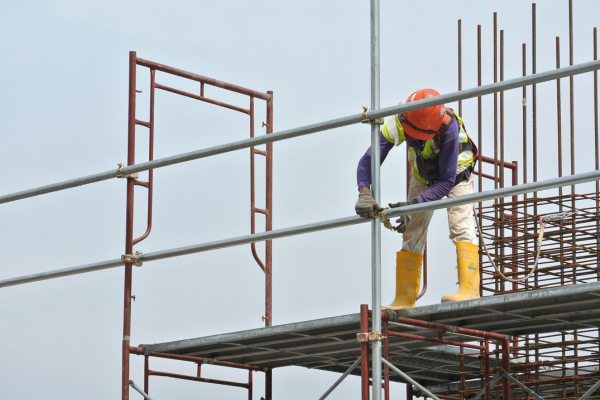
Construction sites, particularly those involving scaffolding, present inherent risks that demand vigilant safety practices. The OSHA 3150 guide outlines critical hazards and compliance measures, emphasizing the need for systematic risk management. Here, we explore common scaffolding risks and how Universal Safety Tags, Ladder Tags, Scaffold Tags, and Colour Coded Scaffold Tags can mitigate these dangers while aligning with OSHA standards.
Key Risks on Scaffolding Sites
Falls from Height
OSHA Reference: Fall protection is mandatory for workers over 10 feet (Page 6). Missing guardrails, inadequate personal arrest systems, or unsecured platforms heighten fall risks.
How safety tags can help: Use Colour Coded Scaffold Tags to indicate inspection status:
- Green (OK): Scaffold is fully planked, guardrails intact, and safe for use.
- Yellow (Caution): Minor issues detected (e.g., loose planks); use with heightened awareness.
- Red (Danger): Unsafe structure (e.g., unstable base); prohibit access until repaired.
Falling Objects
OSHA Reference: Toeboards, screens, or debris nets are required to protect workers below (Page 8).
How safety tags can help: Universal Safety Tags can mark equipment and highlight areas that are hazardous to workers.
Structural Instability
OSHA Reference: Scaffolds must support 4x the intended load (Page 8). Overloading or improper assembly can lead to collapse.
How safety tags can help: Scaffold Tags document inspection dates and load limits, ensuring only competent personnel approve use. A Red Tag immediately flags overloaded or damaged structures.
Improper Access
OSHA Reference: Ladders or stairways must be used if platforms are >24 inches above access points (Page 10).
How safety tags can help: Ladder Tags verify ladder integrity, noting defects like broken rungs or slippery surfaces. A Yellow Tag can indicate temporary fixes, while a Red Tag restricts unsafe access.
Electrical Hazards
OSHA Reference: Scaffolds near power lines require specific clearance distances (Page 41).
How safety tags can help: Colour Coded Tags alert crews to proximity risks, with Red Tags prohibiting use near live wires until clearance is confirmed.

Why Tags Matter
- Visual Communication: Colour coding provides instant hazard recognition, reducing human error.
- Compliance: Tags align with OSHA’s emphasis on pre-shift inspections by competent persons (Page 12).
- Accountability: Detailed tags track inspection history, fostering a culture of transparency and responsibility.
Integrating Tags into Safety Programs
Pairing these tags with training (as mandated in OSHA 1926.454) ensures workers understand their meanings. For instance:
- A Green Scaffold Tag reassures workers the structure meets OSHA’s platform construction criteria (Page 8).
- A Red Ladder Tag prevents use until repairs address OSHA’s access requirements (Page 10).

Conclusion
Scaffolding risks are manageable with proactive measures. Safety Tags and colour-coded systems not only comply with OSHA standards but also empower teams to prioritize safety daily. By tagging hazards clearly, construction sites can prevent incidents, protect workers, and promote a culture of vigilance.
Stay compliant. Stay safe. Tag it right.
References:
- OSHA 3150 Guide (2002 Revised), 29 CFR 1926 Subpart L


